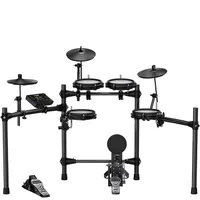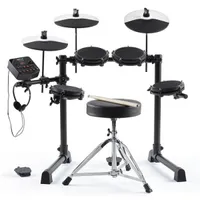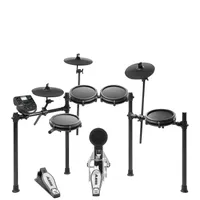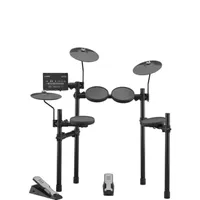Best beginner electronic drum sets 2025: top-rated entry-level e-drums, reviewed by experts
Just starting out behind the drums? These are the best electronic drum kits for beginners, each one tested and rated by pro drummers - plus full reviews and video demos
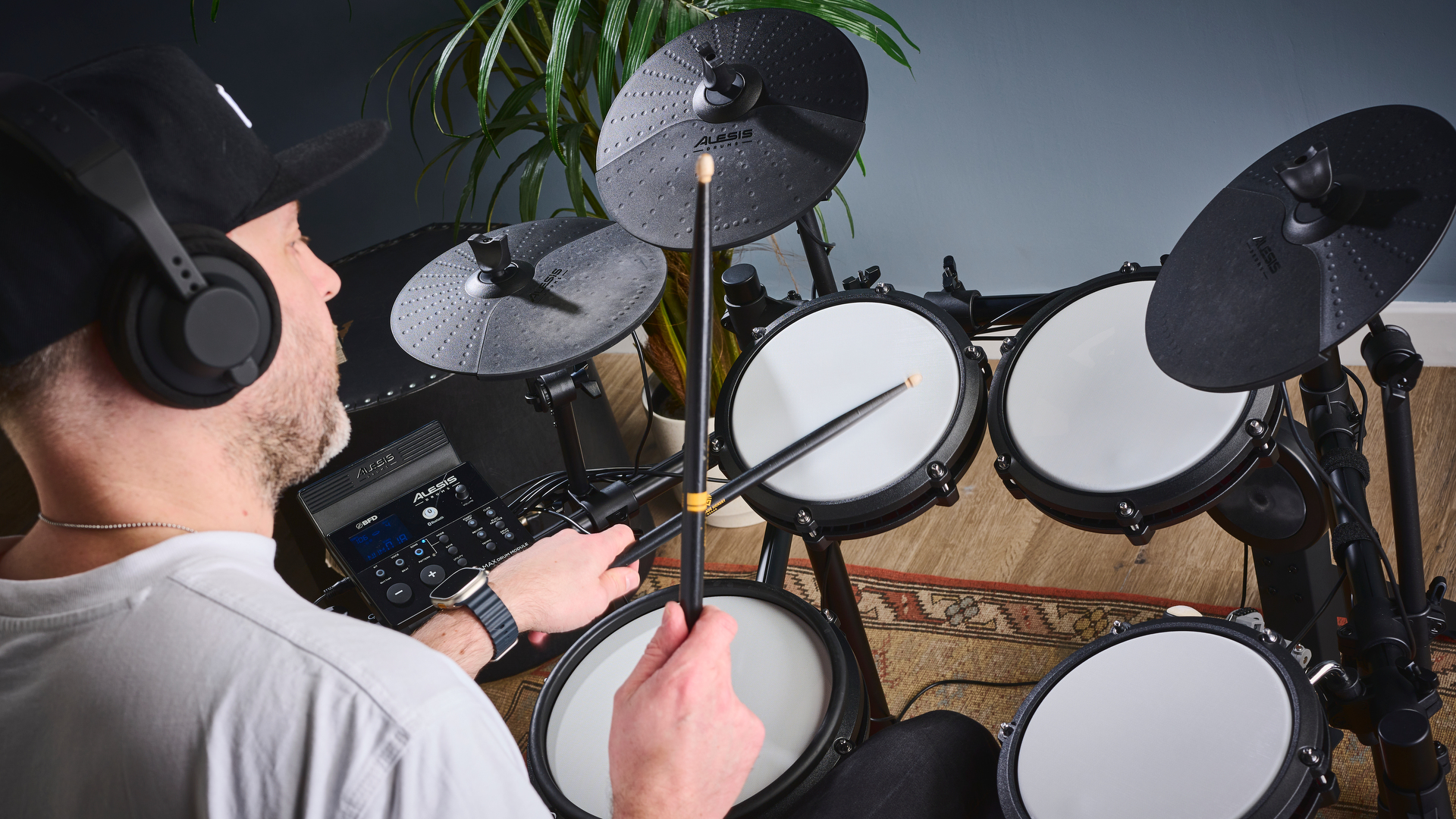
Want all the hottest music and gear news, reviews, deals, features and more, direct to your inbox? Sign up here.
You are now subscribed
Your newsletter sign-up was successful
If you're new to drumming, gearing up with one of the best beginner electronic drum sets will help you develop the fundamental skills that will form the bedrock of your musical future behind the kit. Technique and timing are vital skills for any drummer to learn, whatever their level - and beginner e-kits come loaded with training features geared towards building these skills. It’s unlikely you’ll use an entry-level e-kit in a live environment, but for home practice there’s no better - or quieter - alternative to noisy acoustic drums
When researching the right beginner e-kit for you, it's important that it feels realistic to play (preferably via mesh rather than rubber pads), it sounds good in your headphones and is compact enough to fit into whatever space you've designated for the kit, whether that's a bedroom or the garage. You’ll most likely want phone/laptop compatibility in order to play along to music, too, ideally via a Bluetooth connection. Thankfully, all the major e-kit brands like Roland, Yamaha, Alesis and NUX have you covered here.
Right now, in my opinion the kit that ticks all these boxes is the Alesis Nitro Max, which is the best entry-level kit we've played in some time. It’s a reliable beginner e-kit that feels comfortable to play and, crucially, the on-board sounds are the best I’ve tested at this price point.
Myself and the MusicRadar team personally researches and tests the latest electronic drum sets to provide unbiased recommendations for our guides. When evaluating each kit we focus on ease of use, sounds, build quality and durability, connectivity, amongst other relevant features. Head here for more on how we test beginner e-kits.
If you'd like more guidance - perhaps you're a beginner drummer, or a parent picking up a first kit for your child - our team of experts have pooled their years of experience testing and playing electronic drum sets to create this handy FAQ section.
My top picks
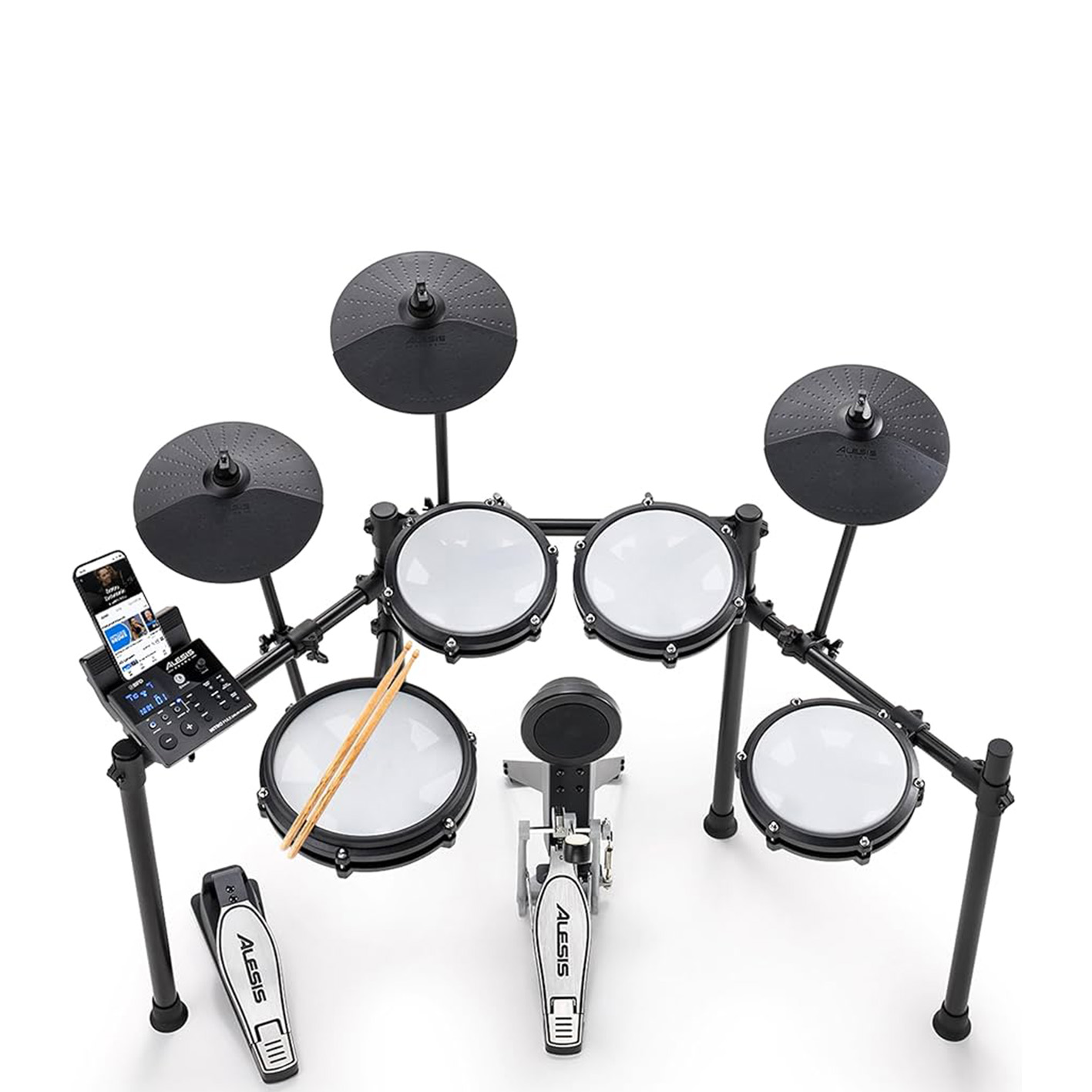
The Alesis Nitro Max has shot straight to the top of the throne as the perfect introductory kit. With realistic mesh heads, Bluetooth connectivity and a sleek module loaded with sounds from the BFD sample library, this kit is streets ahead of most other beginner kits for the money.
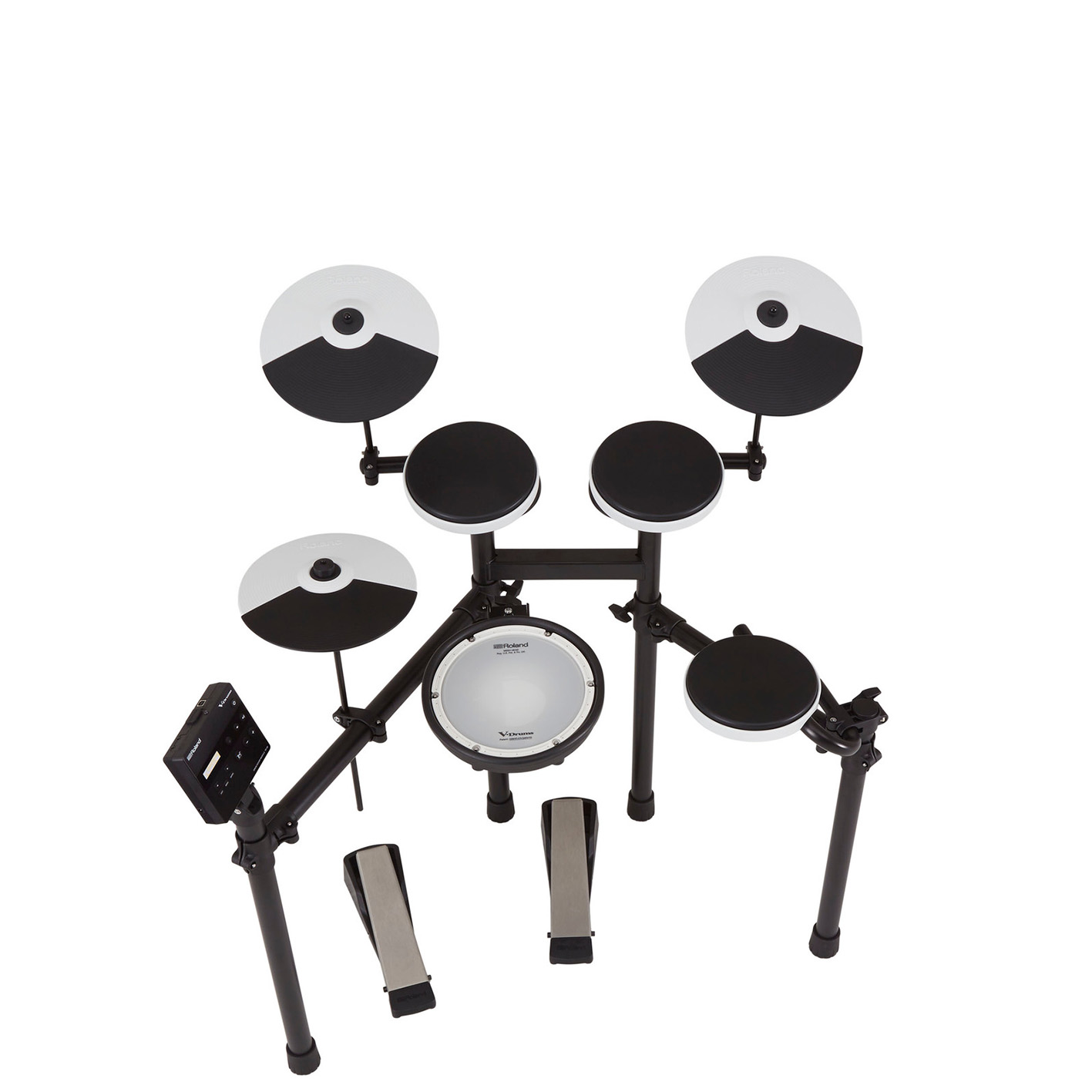
Roland's latest addition to the V-Drums family is a hugely compelling offering if you're just getting started. It features a Roland dual-ply mesh head on the snare, neat and responsive bass drum and hi-hat controller pedals, and studio-quality sounds that are amongst some of the best we’ve heard at this price point.
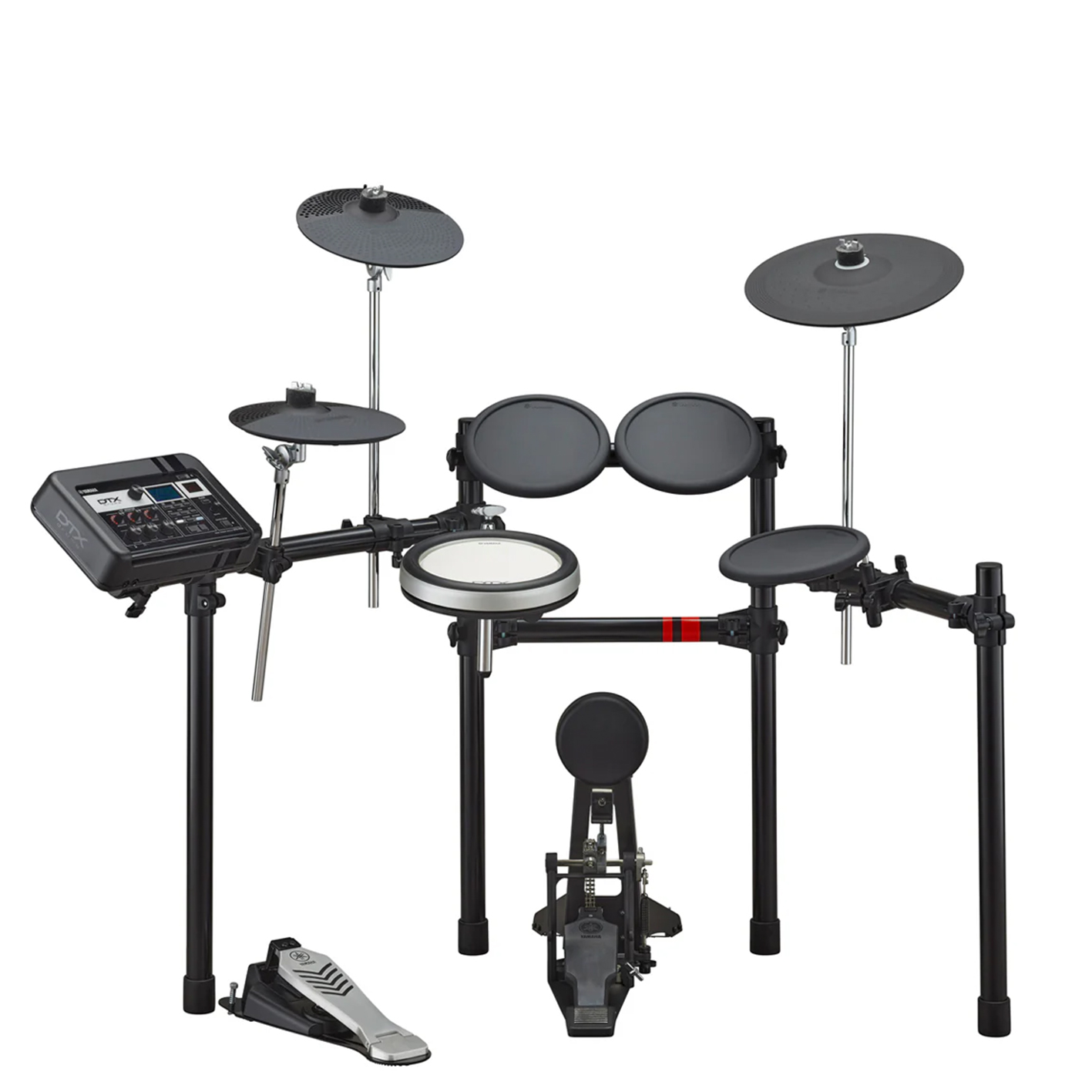
If it’s quality sounds you’re after from your beginner e-kit, and you have the budget to spend a little more, this Yamaha is the one I would recommend. There’s so much this kit gets right, particularly where the module is concerned.
The best beginner e-kit overall
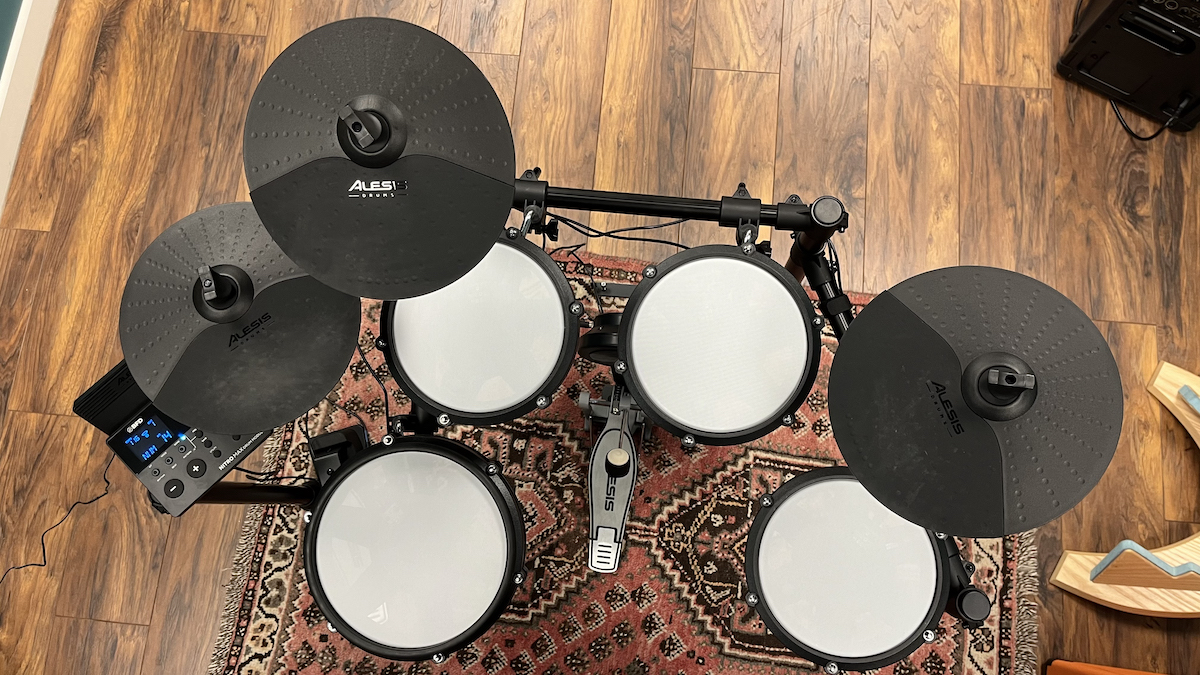
Specifications
Reasons to buy
Reasons to avoid
✅ Buy if you're a beginner with a small budget: For just $/£400 you get so much more than any other kit at this price point, from mesh heads to the excellent BFD sounds and Bluetooth connectivity.
❌ Avoid if sturdy hardware is a deal breaker: The Nitro Max is great value for money, but that doesn't mean it's the most robust kit on test here. There are pricier kits here that deliver more stability and a tougher build.
Build quality & setup ★★★★½
Module & sounds ★★★★½
Overall ★★★★½
The lowdown: The Alesis Nitro Max might be a fairly new entry to the world of e-kits, but in my opinion it's shot straight to the top of the throne as the perfect introductory kit. It takes everything that I loved about this kit’s predecessor, the Alesis Nitro Mesh, and soars to a new level. The mesh heads offered me a wholly realistic playing experience, and I found they're also quieter to the touch than other kits at this level. This alone makes it worth a look. But for me it’s the BFD-derived sounds on the module that really make this kit shine. You won’t find other kits at this price point that sound so good.
Configuration, build quality & setup: Out of the box you get a five-piece kit - 3x 8” single-zone tom pads, 1x 10” dual-zone snare pad and bass drum tower (that comes complete with a bass drum pedal), plus 3x cymbal pads for hats, crash and ride. Everything mounts to a slimline but pretty sturdy 4-post rack that can be adjusted with thumbscrews. Overall I found the build quality to be impressive. It took most of what me and our hard-hitting testers could throw at it, and I have full confidence in recommending it to younger players and beginners of any age.
Everything comes in a single box and, as long as you follow the instructions, it’s an easy and intuitive kit to build – you’ll be up and playing in no time. From opening the box to having the kit set up in a comfortable position and starting to play took me just shy of an hour.
Module & sounds: It's the module that is the most headline-grabbing feature of this kit. It houses 32 drum kits and 440 sounds, all taken from the awesome BFD sound library, which is a first in the electronic drum set world. I really could tell the difference in sound quality compared to other kits at this level.
There are 16 slots for customised, user-created kits too, meaning you can piece together a kit of your preference from the existing sounds. What's more, the Nitro Max comes complete with BFD Player for your computer so you can delve deeper into the sounds and access an even greater library. Sounds have often been an oversight on beginner kits, but the Nitro Max has set a new bar.
With USB connectivity, any budding drummer who is interested in producing hip-hop, lo-fi or electronic music can record into a laptop and get creative.
The Alesis Nitro Max also comes with some excellent in-built software to help beginners learn the discipline of drumming, while the educational icing on the cake is the inclusion of a 3 month free trial to excellent online drum lessons platform Drumeo.
There are 60 play-along backing tracks, a metronome, a sequencer and a performance recorder. If you want to play along to your own music or tracks from a streaming site like Spotify, the Nitro Max is one of the first at this level to offer Bluetooth connectivity, doing away with the need for an additional cable. In my tests I found it easy to connect my device and start jamming.
With a drum key thrown in, a high build quality and a very fair price, there’s nothing to complain about here. In fact, it’s difficult to fathom how the Nitro Max has evolved so far from the Nitro Mesh whilst staying the same price.
Check out more Alesis top picks in MusicRadar’s guide to the best Alesis electronic drum sets for all budgets.
Watch our demo below:
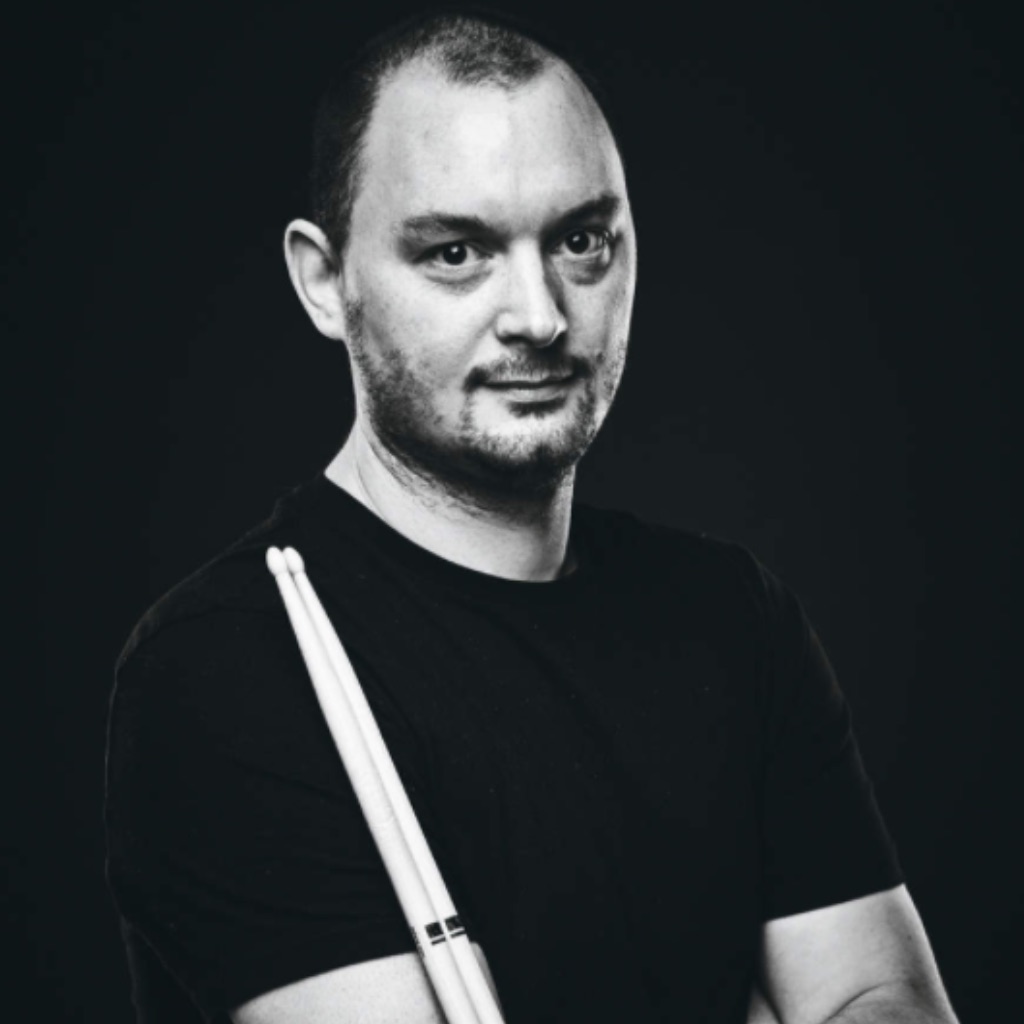
“The Alesis Nitro Max is a well-stocked electronic drum set that you’re not likely to outgrow in a hurry. The BFD sounds are a strong selling point, and while there are a few concessions, it’s a very solid kit for the money.”
Read more: Alesis Nitro Max review
Best build quality
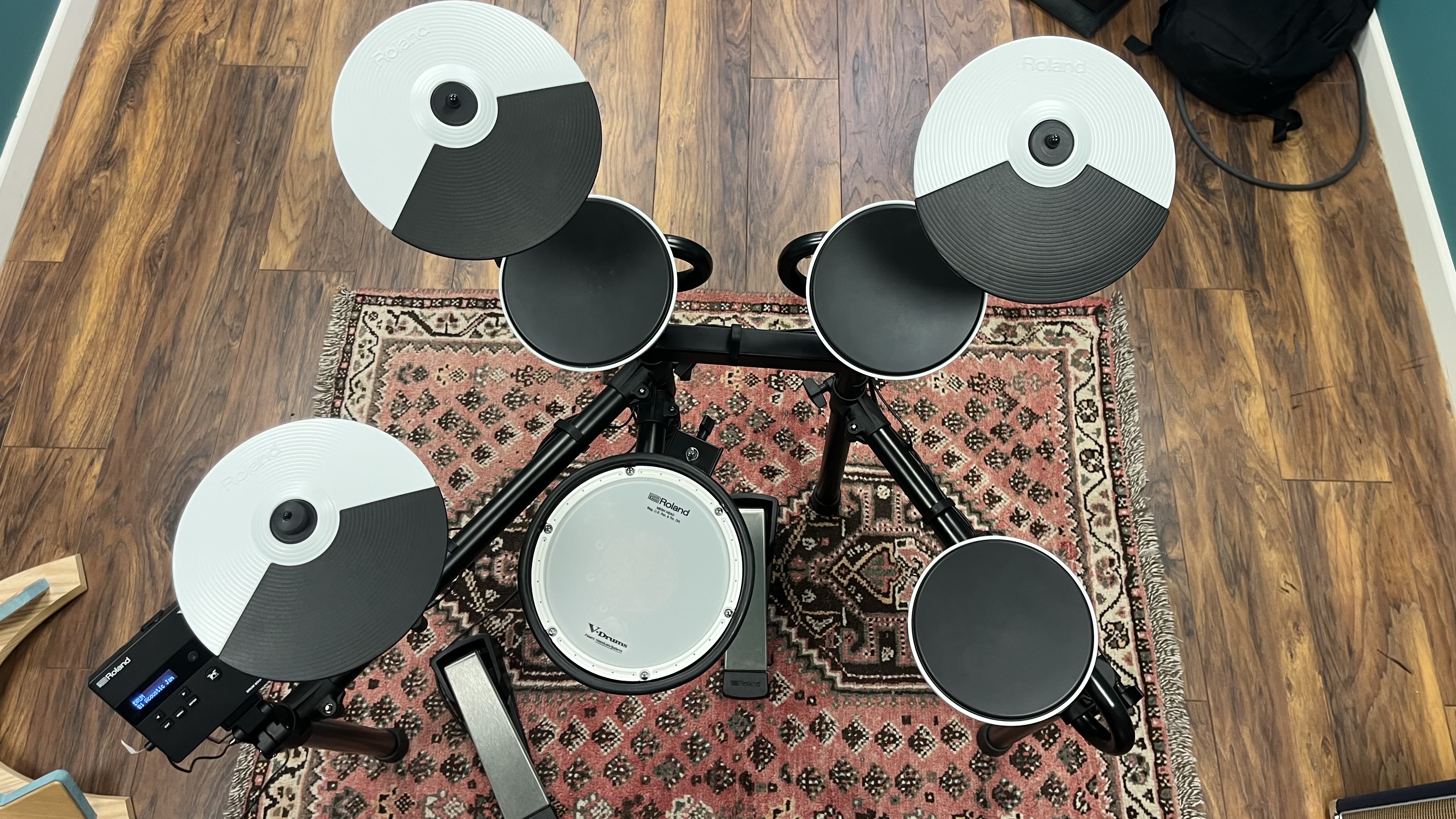
Specifications
Reasons to buy
Reasons to avoid
✅ Buy if you want quality over features: Roland products are built to last and this kit is one of the sturdiest beginner kits we've tested, while the pads feel like they will go the distance through your early drumming years.
❌ Avoid if you want Bluetooth built-in: Want that sweet sweet wireless connectivity with your smartphone or tablet? That's going to cost you extra.
Build quality & setup ★★★★½
Module & sounds ★★★★½
Overall ★★★★½
The lowdown: Roland's latest addition to the V-Drums family is a hugely appealing package if you're just getting started. It features a Roland dual-ply mesh head on the snare, neat and responsive bass drum and hi-hat controller pedals, and studio-quality sounds that are some of the best we’ve heard at this price point (around $660/£420). The TD-02 module also has Bluetooth capability for jamming to your music collection, although you will need an adapter which comes at an additional cost.
Configuration, build quality & setup: This configuration centres around a mesh-headed snare pad, plus 3x rubber pads, 3x cymbal pads and hi-hat and bass drum controller pedals (as opposed to a bass drum pad and pedal). These all mount to a minimalist but supremely reliable rack. Roland is known for its hardware, and even at this price point the robustness does not disappoint. Building the kit from the box is a breeze, too. Everything slots together neatly and stays put. Adjustments are easy to make with the supplied drum key or via thumb screws.
While I wouldn’t usually recommend kits with rubber pads, this is one of the most affordable ways to enter the Roland ecosystem and the mesh snare, killer hardware and excellent module sounds more than make up for the less desirable tom pads. If you really must go all-mesh, then check out the Roland TD-07DMK further down this guide.
Module & sounds: The TD-02 module is stripped-back compared with other Roland kits, sure, but that’s by design. This simplicity means you get just 16 preset kits, a metronome, four Coach modes and USB connectivity as standard. It has all the things you’ll need to get playing right away, and none that you don’t.
Operation is easy - press the big ‘drum kit’ button and scroll through the kits using the cursor up/down arrows. Sounds are largely based around different flavours of acoustic kits and there’s not much in the way of kit editing or enhancements - Roland wants you to find a kit you like in the box and just play.
I found there to be depth, body and weight to the drum sounds, and plenty of variation across the kits. Roland has put in a lot of time to give newcomers an easy way into exploring different types of drum sounds, all the while keeping it rooted in a place that’s going to keep the attention on playing.
There’s Bluetooth functionality for hooking up to a smart device and jamming to music, but you’ll need to purchase a Bluetooth adapter to unlock it - a purchase I highly recommend. If your budget won’t quite stretch, you can still plug your phone, tablet, laptop or any other device with a headphone socket into the Mix In mini jack on the module.
Shuffling between genres on my phone and kits on the module, I never needed to scroll far to find a drum sound that blended well with the style I was playing, which makes the whole experience more authentic all round.
There are more affordable options out there, just as there are kits with more sounds and features, however in my tests I found that the TD-02KV represents a cohesive package that you’ll want to sit down at months (and hopefully years) after you’ve bought it. Add to this some comprehensive coaching functions for developing players and it’s clear that Roland has considered who, how and where this kit is designed for.
Watch our demo video below:

“The TD-02 represents a step up from more generic electronic drum sets with plenty of usable features. It feels and sounds great and while you’ll pay more than some brands, you’ll receive a solid and reliable platform that will take you from beginner to intermediate.”
Read more: Roland TD-02KV review
Best for sounds
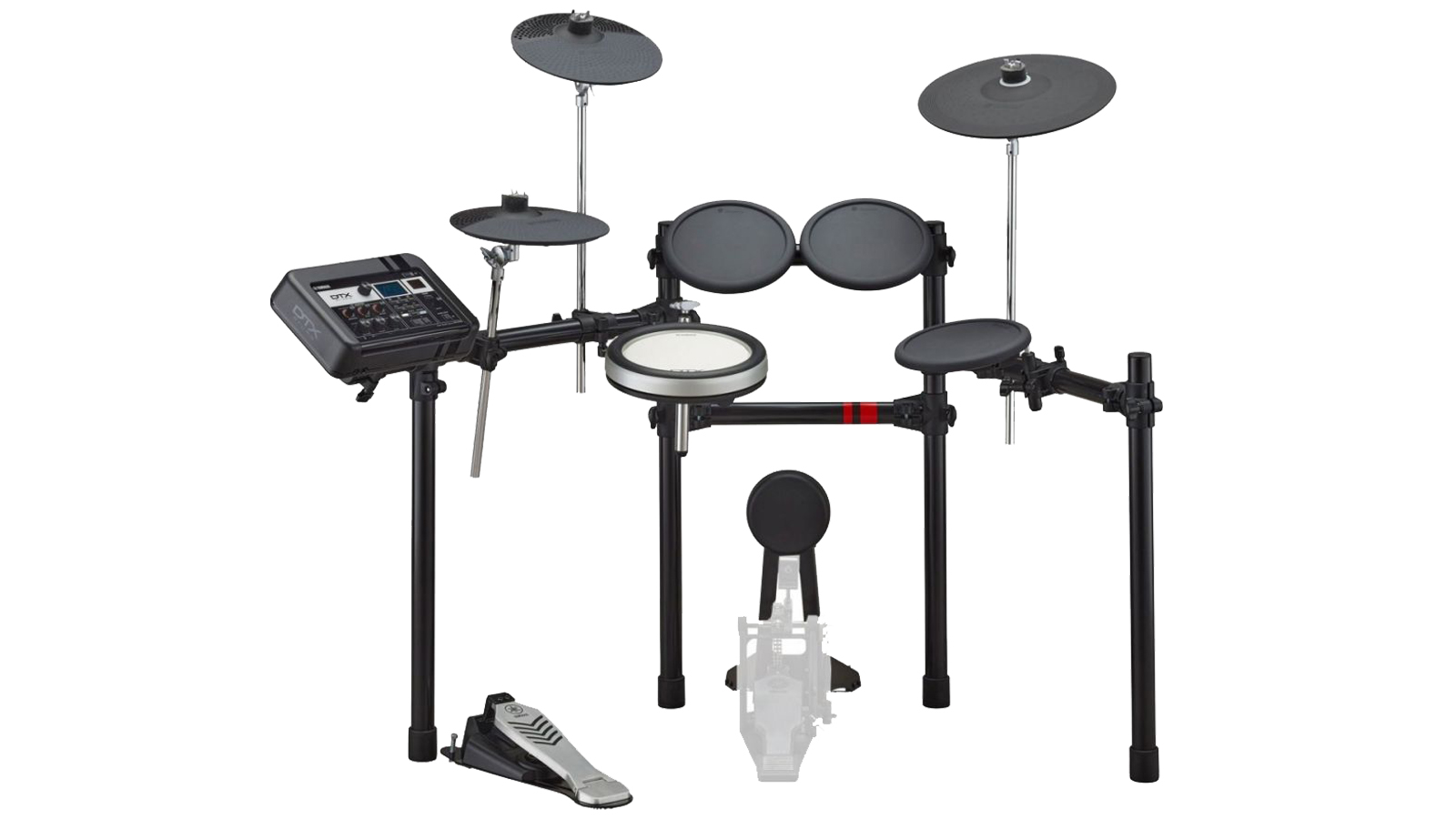
3. Yamaha DTX6K-X
Our expert review:
Specifications
Reasons to buy
Reasons to avoid
✅ Buy if you want the best module: We love the DTX-PRO module for ease of use and the ability to edit and enhance your sounds.
❌ Avoid if you have a limited budget: While this kit is 100% beginner-friendly, it sits at the higher end of the price spectrum, so you need to decide if the extra features and build quality are worth the stretch.
Build quality & setup ★★★★
Module & sounds ★★★★½
Overall ★★★★
The lowdown: Yamaha’s DTX6 series really demonstrates what a mid-range kit can be capable of. The 3-zone snare and ride cymbal pads deliver a superb playing feel that most drummers yearn for from acoustic kits. I even felt that the rubber padded toms on this lowest-priced option in the DTX6 series could be forgiven - because there’s just so much this kit gets right, particularly where the module is concerned. And if it’s quality sounds you’re after from your beginner e-kit, and you have the budget to spend a little more, this Yamaha is the one I would recommend.
Configuration, build quality & setup: Yamaha has always been known for its class-leading hardware, in no small part thanks to the years they’ve spent producing hardware for their acoustic drum arm. So in terms of the kit itself, I have no complaints over build quality, how sturdy it is and how much punishment it can take.
Building the kit out of the box is a breeze too, with the 4-post rack coming pretty much ready to go, barring the addition of a few cymbal arms and other attachments. Plus, there’s plenty of real-estate to position pads where you like.
This configuration comprises a TCS (Textured Cellular Silicone) snare pad - this is Yamaha’s answer/alternative to mesh and I genuinely love playing it. It’s far superior to rubber and offers a similar feel to mesh. You also get 3 rubber pads for toms, 3x cymbal pads (with a hi-hat foot controller) and a rubber-headed bass drum tower. The only real drawback of this kit is that the bass drum pedal isn’t included, so you’ll need to front the cash for one on top of the kit.
In terms of playing feel, Yamaha has nailed the vital components - kick, snare and hats - and ensured they’re well spaced and feel comfortable and natural in use, whether you’re grooving out or playing blazing single strokes. Despite my reservations, the rubber toms do the job just fine and I didn’t experience as much fatigue as I was expecting.
Module & sounds: So I love the hardware, clearly. But what about the module? Well, since Yamaha first updated its e-kits back in 2022 and introduced the new DTX Pro module - which features on every kit in the DTX 6 range - I’ve been a big fan. It delivers some of the best sounds you’ll hear on any e-kit module at the beginner to intermediate level. They’re full, rich and pleasing to the ear.
There’s also plenty of editing available to the built-in sounds, giving you a range of options to customise your kits. The kit modifier knobs are divided up into ‘Ambience’, ‘Compression’ and ‘Effect’. These tweak-able settings make it so simple to easily get in touch with the nuances of kit sounds in a way that is normally incredibly hard to replicate on an electronic kit - this is a valuable feature for beginner drummers especially.
Cubase A1 is also included, meaning budding session drummers and beat makers can start creating immediately. Bundle this all together with the classic Yamaha build quality and you’ve got a solid option, worth its slightly higher price tag.

“The Yamaha DTX6K-X is a welcome return to the e-kit market from Yamaha. The TCS snare pad feels great to play, and the included sounds are among the best we’ve played at this price range in recent times. The comprehensive effects section opens up a lot of experimentation too, and the ability to load-in your own samples means that this module is likely to fulfill the creative needs of a lot of drummers from the off.”
Best for kids
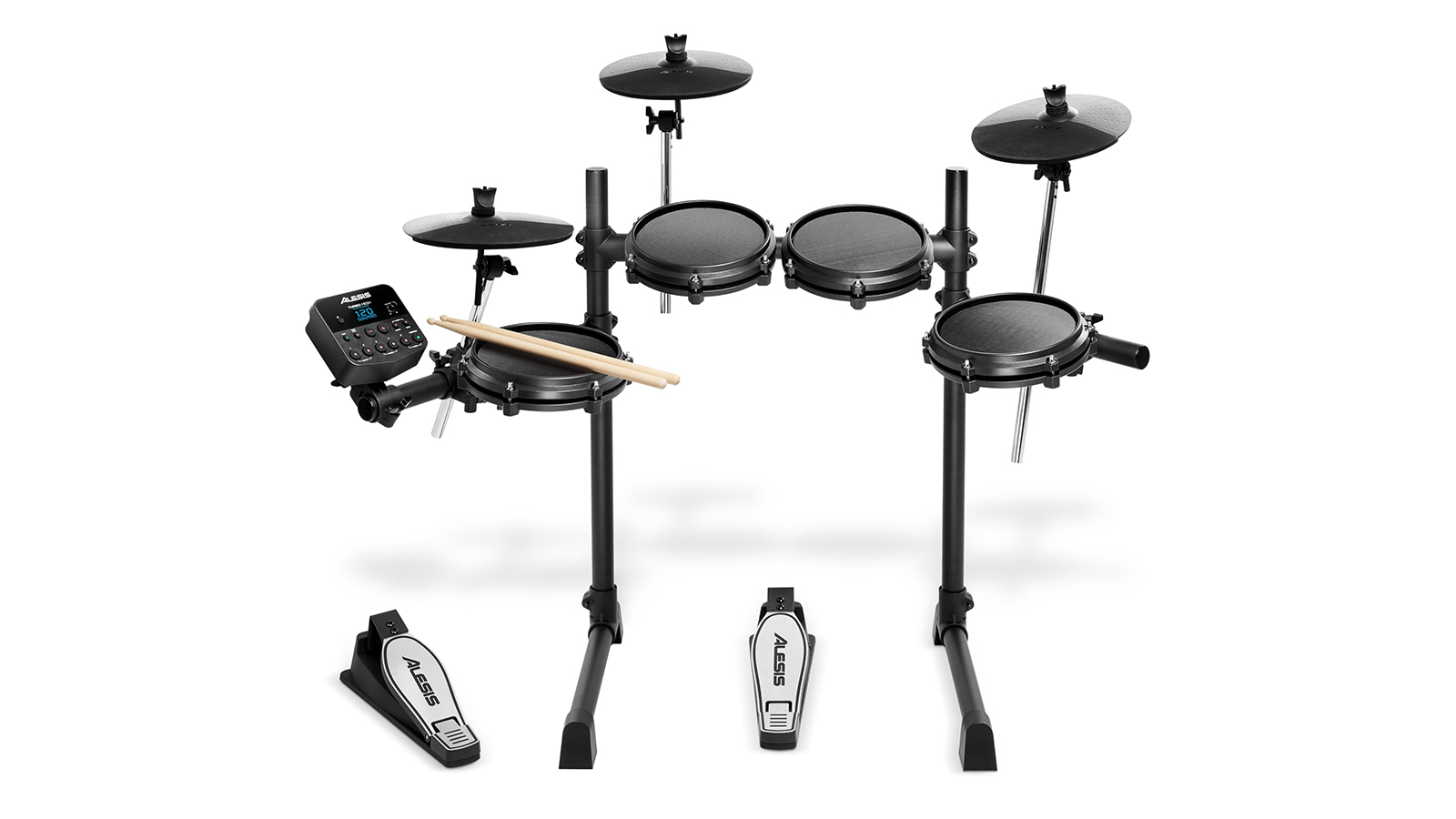
Specifications
Reasons to buy
Reasons to avoid
✅ Buy if you're on a really tight budget: Getting into drumming isn't cheap, but if you're willing to cut a few corners, the Alesis Turbo Mesh acts as a very affordable entry point.
❌ Avoid if you're planning on sticking with the drums: With the best will in the world, if you really take to drumming, you're likely to want better sounds, more adjustable hardware and better learning tools pretty quickly, so this could prove to be a false economy.
Build quality & setup ★★★★
Module & sounds ★★★★
Overall ★★★★
The lowdown: Alesis has always been excellent when it comes to value for money and the 7-piece Turbo Mesh only reinforces this. For around $299/£285, you have almost everything you need to start your drumming journey in the box, making it a great electronic drum set for kids; thoughtfully, it includes a pair of sticks, so the only thing you’ll need to budget for is a stool and a pair headphones or monitor. Invest in this kit and you’ll also find a comprehensive metronome and Melodics learning software bundled in.
Configuration, build quality & setup: The drum heads on the Turbo Mesh are, as the name suggests, mesh instead of rubber, which I found to be the far better and more realistic option. It’s a real boon to get mesh pads at this price; it’s becoming increasingly common, but the Turbo Mesh is the best version of a super budget kit with mesh heads that I’ve played.
It’s a little fiddly to set up, but use the instructions and watch a few YouTube tutorials and you should be ready to play in no time. Because of the dimensions and limited adjustability, I would recommend this kit mainly to smaller players or children just getting started. For getting into playing, it’s a supremely accessible option.
Module & sounds: The module has 120 sounds on board, divided up into 10 kits, as well as 30 songs to play along to, which can be customised to keep/omit certain instruments in order to better understand how each song works. Alesis states that the onboard sounds use ‘Intelligent Dynamic Articulation’ technology to sound more realistic - and while they aren’t challenging the dynamic sounds of higher-end e-kits, they aren’t bad at all when you consider the needs of most beginner drummers. I found the module offered up at least a few drum kit sounds that felt usable and not offensive to the ears.
There are, of course, loads of cool coaching modes on board to help beginners hone their skills too.
The Alesis Turbo Mesh also features smartphone compatibility, meaning that I was able to play along easily to my favourite music from any streaming service or video streaming platform, although this was via a wired rather than Bluetooth connection. There’s also a MIDI output for plugging in and recording into your laptop or audio interface.
With a generous amount of features at a very low price, this kit feels like an open-arms invitation for children and beginners to enter the world of drumming. Solid build quality, Melodics software and the succinct learning tools on board the module will provide brand new drummers a jumping off point to help build vital rhythmic foundations.
Watch our demo video:

“The Alesis Turbo Mesh is a fantastic electronic drum kit for anyone who’s looking to give the drums a go for the very first time. For the money, the build quality is pretty hard to beat, the all-mesh pads are a boon at this price and the compact footprint means it’s more convenient than ever to have an e-kit in your home.”
Read more: Alesis Turbo Mesh review
Best mesh pads
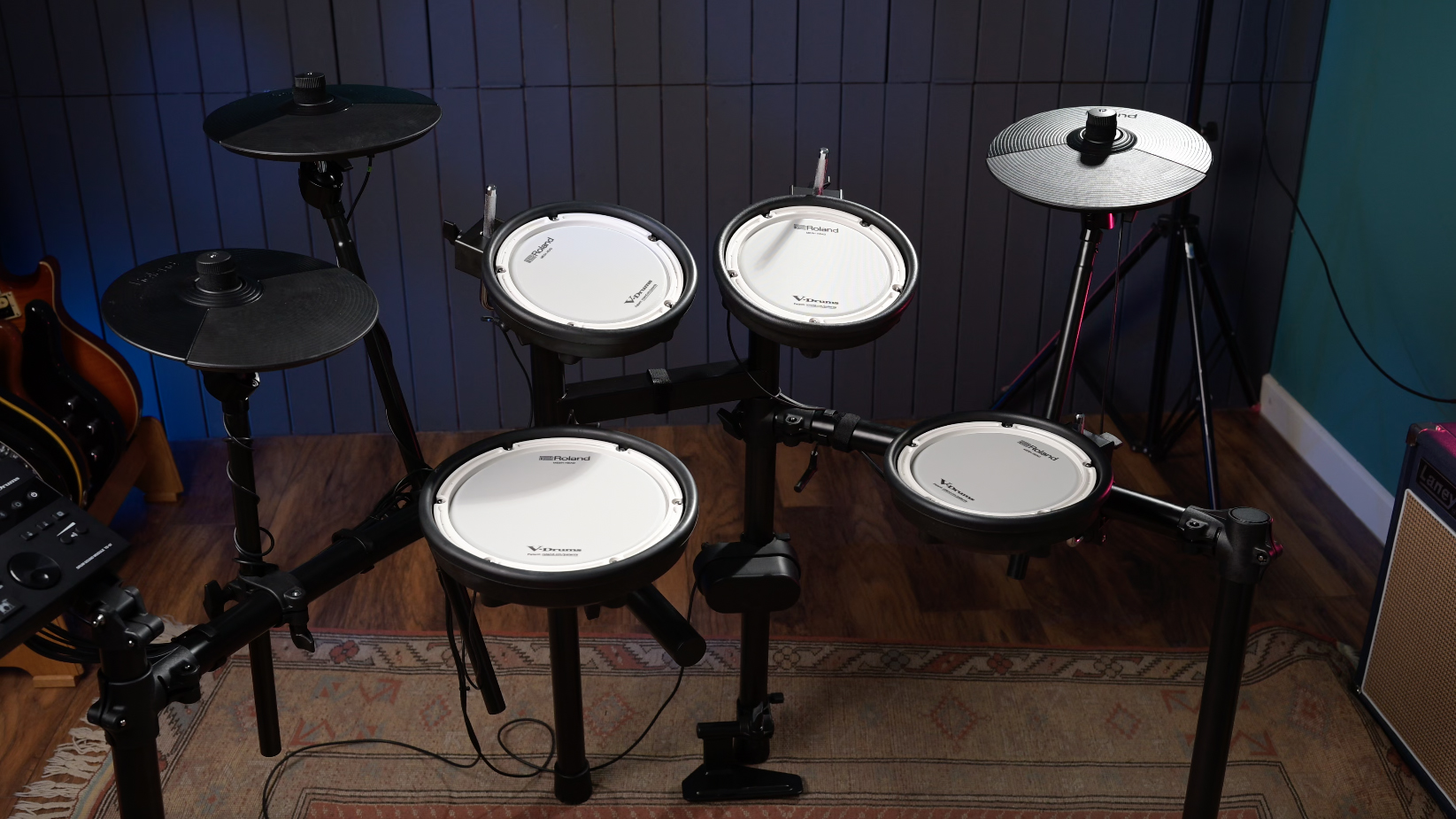
Specifications
Reasons to buy
Reasons to avoid
✅ Buy if you want a kit that will take you to intermediate level: We don't just recommend this kit to beginners. It's a quality setup that would make an ideal home practice kit for drummers of any level.
❌ Avoid if you want a separate bass drum tower: The fixed bass drum pad limits your set-up options which might have a negative impact when you move to an acoustic kit.
Build quality & setup ★★★★½
Module & sounds ★★★★½
Overall ★★★★½
The lowdown: A more recent addition to Roland's excellent TD-07 range - and the 'DMK' version of one of the best Roland electronic drum sets - is a hugely compelling offering if you're getting started or progressing with your playing. It features Roland's dual-ply mesh heads on the snare and tom pads, a clever bass drum pad built into the rack system and pristine, studio-quality sounds that are customisable. If your budget will stretch, this kit should definitely be on your ‘to-try’ list.
Configuration, build quality & setup: Once you get your foot in the door with Roland’s TD-07 range you’ll find yourself in a world of ‘proper’ e-drums. Where the TD-02 range is designed as an entry point for new drummers, TD-07 is aimed at those players who are going to stick with it and need a kit that will help them grow well beyond their beginner years.
While it’s compact, the 07DMK doesn’t feel cramped, and it’s possible to get the mesh snare and tom pads just where you need them. As with all Roland gear, setup is a breeze and everything feels high quality in the hand. Some budget gear can feel a little fragile when tightening bolts and thumbscrews, but I experienced none of that here.
One of my favourite features of this kit - and one that helps the 07DMK retain a small footprint - is the bass drum pad built into the third leg of the rack. It’s wide enough to take a double pedal and doesn’t feel massively different to a standard bass drum tower. A really neat feature.
I thoroughly enjoyed the TD-07's feel and specs, but for those who want a more 'real' feel - a full bass drum tower and pad - then the higher spec models may be more suitable, such as the Roland TD-07KV or KX, that former of which also comes with a real hi-hat stand.
Module & sounds: The TD-07 module’s preset kits include a mixture of rock, metal, pop, studio, reggae, jazz, electronic, percussion kits and many more. As is usually the case with Roland, the recorded samples are of a high-quality and when combined with the satisfying physical response of the pads, kept me coming back for more.
Despite a gratifying playing experience out of the box, the TD-07 also offers a surprising amount of customisation for those who like to delve deeper. This includes the ability to change and move virtual microphones, alter room ambience and experiment with a range of effects. These are welcome features for a kit of this size and price point and mean you can dial in some fantastic sounds.
TD-07 module is geared up with Bluetooth to connect to your smartphone or tablet so you can play both streamed music and the kit through your headphones. This functionality has been around for a few years now - Roland was the first to include it - but it’s great to see it landing more and more at this price point.
Watch our demo video below:
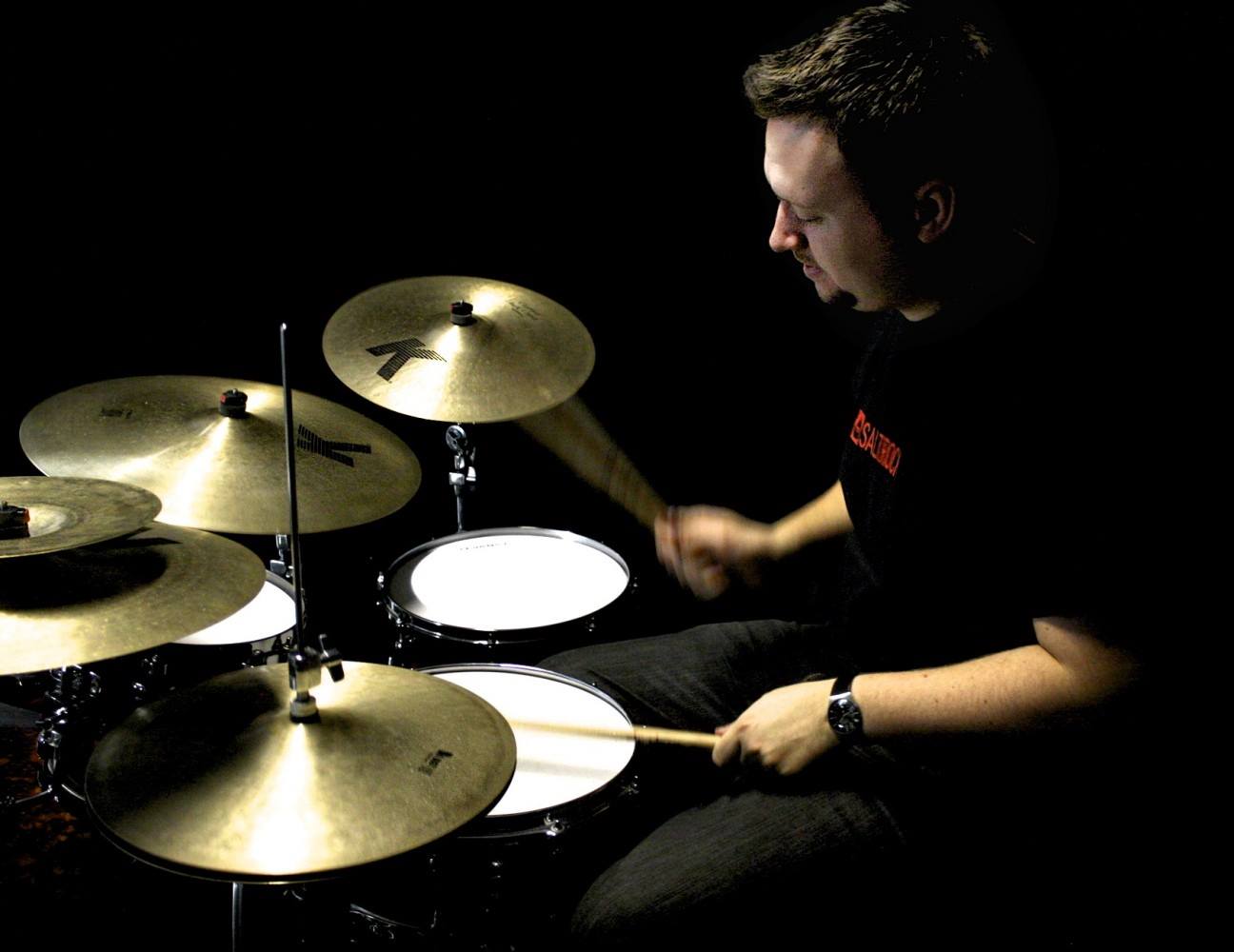
“Newer drummers will find the TD-07DMK plays well out of the box but there’s plenty of growing room with custom kits and surprisingly deep effects menus.”
Read more: Roland TD-07DMK review
Best full-size kit
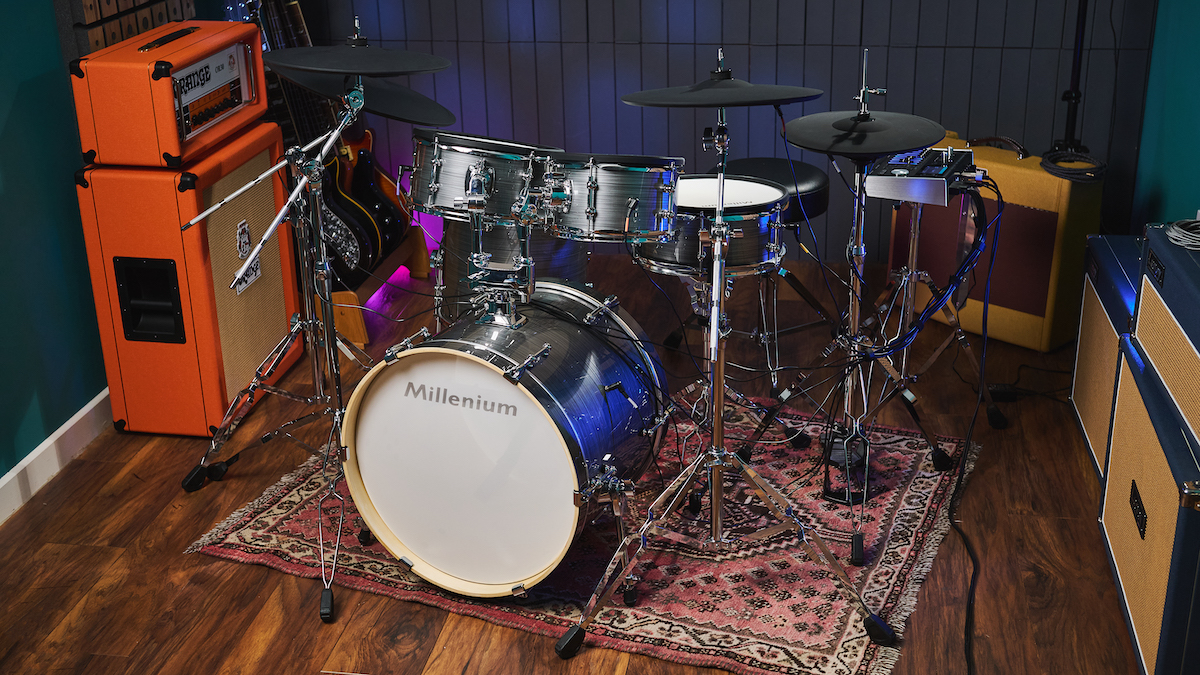
Specifications
Reasons to buy
Reasons to avoid
✅ Buy if you want a kit that looks and feels the part: It's becoming more common to see e-kits with full acoustic shells. This is one of the most affordable entry points to that type of setup.
❌ Avoid if you want the best sounds: The majority of your budget covers the cost of the hardware, so inevitably corners have to be cut elsewhere; in this case the sounds. That said, you could just use the kit as a controller for sounds on your laptop.
Build quality & setup ★★★★½
Module & sounds ★★★★
Overall ★★★★
The lowdown: With full-size, real wood shells and mesh heads all round, the Millenium MPS-1000 offers beginners a more affordable entry point into the latest trend of acoustic looks/electronic versatility. I’ve played a number of kits from Thomann’s e-kit brand Millenium now, and I can really vouch for the level of value they deliver.
Configuration, build quality & setup: The MPS-1000 comes with all of the shells and hardware you need to start playing out of the box, including a dedicated stand for the module and a pair of sticks (you will need your own stool, however), and with an 18” ride cymbal, 13” hi-hats and a pair of crashes, you have a well-stocked kit that shouldn't need upgrading or adding to for a very long time.
During my tests I found that the noise in the room is similar to that of a regular electronic kit, but the size and spacing of the setup makes transferring techniques and feel between electronic and acoustic kits a breeze.
Module & sounds: While the preset module sounds are reflected in the price and some of them lack depth or true tonal quality, there’s EQ and effects as well as basic editing on board to help you tailor them to your liking. Additionally, I’d recommend experimenting with the pad settings within the module to get the response just right.
There’s 820 sounds in total, ranging from acoustic kits to samples of classic drum machines, world and orchestral percussion and more. This is all arranged into 40 preset kits. There’s an additional 40 slots for you to save your own kit creations into, plus it comes stocked with 70 play-along songs for you to jam to. While these are great to have, what’s even better is the fact that the module also includes Bluetooth, so you’re free to beam whatever music you like into the kit, and blend it with your drum sound for jamming.
The front panel itself is nicely laid out, with some stylish looks, and individual faders for each voice. There’s a 3.2” colour LCD screen in the top right, and thanks to the clearly marked function buttons on the whole I found it easy to use
One key feature of the MPS-1000 module is that there’s an additional USB socket for plugging in a memory stick. That’s because, as well as its own sounds, the MPS-1000 also allows you to import custom .wav files for utilising in your kit, a feature that has become increasingly in-demand, and it’s great to see it appearing on lower-priced kits.

“A solid entry-point into the acoustic-look/electronic kit market. What it lacks in sound quality, it makes up for in playing feel and style.”
Read more: Millenium MPS-1000 review
Also tested
We're always testing new drum gear. These are some of the other beginner e-kits we've reviewed recently that would also be worth your attention:
NUX DM-210 ★★★★½
The NUX DM-210 is an entry-level, beginner electronic drum set that punches well above its weight when it comes to playability and features. This lightweight, small-framed kit is equipped with all-mesh drum pads, an independent kick-drum, as well as a few welcome extras such as Bluetooth audio, an aux-in and coaching mode.
Read more: NUX DM-210 review
Alesis Debut ★★★★
Alesis have always been excellent when it comes to value for money and the Debut only reinforces this. For less than $300/$200, you have absolutely everything you need to start your drumming journey, making it a great e-kit for kids; thoughtfully, it includes a stool, sticks and headphones, as well as a comprehensive metronome and Melodics learning software bundled in.
Read more: Alesis Debut review
Alesis Nitro Mesh ★★★★
Whether you are using the Nitro Mesh as a younger drummer's first kit or as target practice for experienced players, the classy fit and finish, compact footprint and modest price make it a very attractive – and fun – option. It's still availablem but has now been superceded by our number one choice, the Alesis Nitro Max.
Read more: Alesis Nitro Mesh review
Yamaha DTX402K ★★★★
Yamaha’s DTX402 series is perfect for beginners. Building on years of drum-building expertise, they have packaged together everything a drummer needs to get started. The rubber pads feel high quality and responsive, albeit a little stiff in comparison to mesh alternatives. This model is getting pretty long in the tooth now, but it still represents decent value for money and sits pretty in our best Yamaha electronic drum sets guide.
Read more: Yamaha DTX402K
How to choose the best beginner e-kit for you
Electronic drum kits are a seriously good option for beginner drummers and it’s easy to see why. They’re compact, neighbour-friendly and loaded with sounds that’ll keep new players inspired. Whether you’re a parent investing in your kid’s first setup, a new drummer who’s decided to get serious, or you’re simply rediscovering the sticks after years away, picking the right starter kit matters. This section will walk you through the essentials, so you can make a confident and informed choice.
- Prioritise playability. Always
For starters, I’d suggest kits with mesh heads over rubber pads. Mesh heads feel closer to real acoustic drum skins, offering better bounce and quieter impact. Responsive pads will help beginners develop proper technique right from the start. Playability also relates to how easy it is to set up the kit in a way that’s comfortable for you, depending on your frame and playing style. Most importantly, can the snare drum, kick drum and hi-hats be positioned in a way that feels natural? - Consider the module (or brain)
The module determines what the drums sound like in your headphones or through a speaker. Beginners should aim for easy navigation (how you select sounds and other settings), decent drum and cymbal sounds, and useful built-in features like coaching modes, a metronome and Bluetooth audio for jamming along to tracks. Fair warning, at the very beginner level, the sounds will be a mixed bag, but in my opinion if you have at least one decent acoustic option that sounds good to your ears, you’ll be good to go. The inclusions in this guide all tick this box. - Connectivity options matter
Think ahead: will you want to record yourself? Will you use headphones or an amp? Connect to a computer or smartphone? USB or MIDI outputs are useful for future-proofing if you plan on creating music with your kit. Audio inputs or Bluetooth mean you can play along to music, which is a cornerstone of beginner drumming development. - Build and dimensions
Make sure the kit will fit the intended space. Foldable or compact rack designs help in bedrooms and tight spaces, but you don’t want to feel too cramped behind the kit, so invest in something that works for the space you have. - Budget for extras
While some kits come with everything you need in the box, not all kits include headphones, a stool or sticks. Some even skip the bass drum pedal. You might need to factor in these essentials when budgeting, and don’t forget an amp or monitor if you want to hear your playing without headphones.
And here’s 4 things you shouldn’t worry about at this level:
- A kit you can play live
That can come later, and you might want a separate acoustic kit for that when the time comes. - Killer looks
On the whole, e-kits can’t compete with acoustic kits in the looks department, but particularly at the beginner level they’re not the prettiest things to look at. But honestly, don’t worry about it. - A touchscreen
A touchscreen on your module isn’t particularly necessary and will only add to the cost of your kit. - Your dream brand
You’ll pay more to climb the brand ladder, so don’t pay too much heed to the logo on the module at this stage.
FAQs
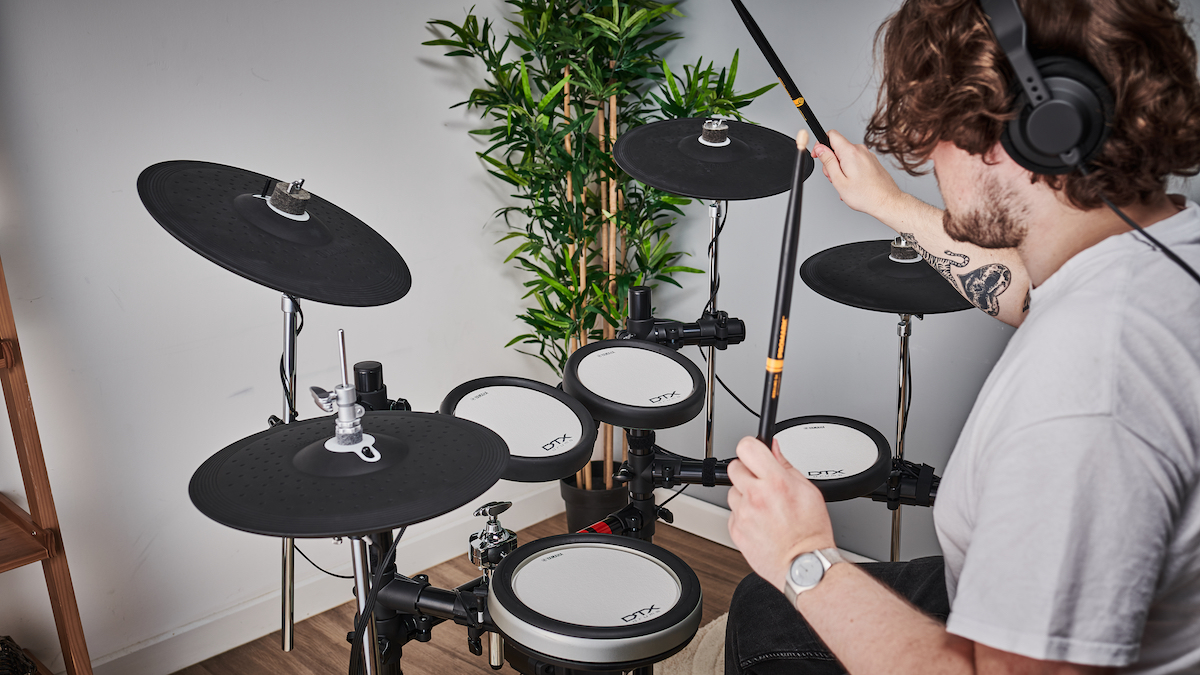
Is an electronic drum kit a good option for beginners?
In many ways, an electronic kit is actually the best place for beginners to start learning, since they offer an ergonomically realistic simulation of playing a full drum kit without the worry - and natural tentativeness - that comes with having your mistakes heard out loud. Of course, the reduced noise factor should also make people in your household more likely to be open to the idea of a drum kit in the first place.
Moreover electronic kits can be cheaper than acoustic alternatives and take up significantly less room.
Manufacturers will also usually include learning programmes within the drum module. Features include play-along tracks, precision tests (where a score is given, based on how accurate your performance and timing is), the ability to record yourself and assess your performance and, of course, the all important metronome for working on your ability to play in time.
Still not convinced? We go deeper into the acoustic vs electronic drums debate in this article.
What do you get with a beginner electronic drum set?
The best beginner electronic drum sets comprise a set of drum and cymbal trigger pads connected by cables to a drum module (a small computer which holds the data, sometimes referred to as a brain), affixed to a hardware frame (or drum rack).
Typically, beginner kits come with eight drums altogether - one snare, three toms, three cymbals (hi-hats, a crash and a ride) and a kick drum - as standard.
Kick drums (also known as bass drums) will either be in the form of a standalone pad with a separate bass drum pedal, or a 'controller' style pedal which plugs directly into the module.
Some sets may offer an additional tom or cymbal pad and some at this end of the price spectrum will also bundle extras like a drum throne, headphones and sticks. More on that below...
What's the difference between mesh and rubber pads?
Mesh pads are quieter, more responsive, and closer in feel to acoustic drums. They can be tensioned for feel using a drum key, too. Rubber pads will make your kit cheaper, but often louder acoustically and less forgiving. We would always recommend mesh over rubber pads if your budget allows.
Will I get drumsticks with my beginner e-kit?
Most beginner e-kits come in a single box containing almost everything you need to get started, including drumsticks. You’ll get all the parts mentioned above, plus all relevant cabling, a power supply and a drum key for tightening parts and tensioning drum heads, if your kit offers that facility. You should also get drumsticks and maybe even a pair of headphones for drummers in the box.
What you will need to check is whether your kit comes with pedals. Many of the best beginner electronic drum sets feature standalone hi-hat and bass drum controller pedals. Or, your kit may have a bass drum tower and separate bass drum pedal. If it’s the latter, check that the pedal is part of the bundle.
The final piece of the puzzle is a drum throne - a dedicated stool designed for drumming. You can get away with a standard stool or chair to begin with, but unless these are adjustable you’ll quickly be looking for something that is in order to dial in the optimal height for comfortable playing.
Are beginner e-kits easy to set up?
On the whole, yes. E-kits are relatively painless to set up and it’s possible to get everything connected and ready to play reasonably quickly. We’ve compiled a guide covering how to set up an electronic drum set so, whether you’re wondering whether this will be a convenient purchase, or you have your kit home and are scratching your head, we can help.
Is it easy to learn to drum on an electronic drum set?
In a word, yes. Whilst they are not quite as intuitive to the touch as acoustic kits and oftentimes the pads have smaller surface areas, these minor issues aren’t deal breakers when you’re at the start of your playing journey.
Electronic drum kits provide easy access to many different sounds; allowing you to explore various genres at the press of a button. Without exception they come with a metronome feature to ensure that any learner can work on timing - the most essential skill a drummer needs.
On top of this, when learning any new instrument there is always going to be an initial period of getting to grips with things which, in drum terms, results in a lot of bashing away. It’s much easier for a beginner to do this on an electronic drum kit because headphones allow for privacy and peace of mind (for both the player and others in the house). Not to mention the on-board programmes that are aimed squarely at teaching beginners how to play.
Do I need to buy an amp for my electronic drum set?
Not necessarily. Beginner electronic drum kits are best used with headphones for private practice (check out our round-up of the best headphones for drummers here). If you are going to use an electronic kit for live purposes, or would just like to be able to play out loud, perhaps to jam with friends, then it would be worthwhile investing in an electronic drum amp.
However if your reasons for purchasing a beginner e-kit are primarily for practice, learning and potentially recording into a DAW, there is no real need for an amp.
How much should I spend on a beginner electronic drum kit?
You can get a decent beginner e-kit for around $/£300-$/£500. Spending a little more (up to $/£800) gets better mesh heads, more realistic feel, more sounds/features and amore capable module.
Can I connect my e-kit to a computer?
Most beginner kits have USB MIDI, which enables you to connect to recording software or drum VSTs on a computer. Some also offer audio out for recording the built-in sounds.
Do e-kits need tuning or maintenance?
No tuning required! Mesh heads can be tensioned for feel, but there's minimal maintenance beyond tightening loose bolts and wiping down surfaces to keep dust and grime at bay.
E-kits jargon buster
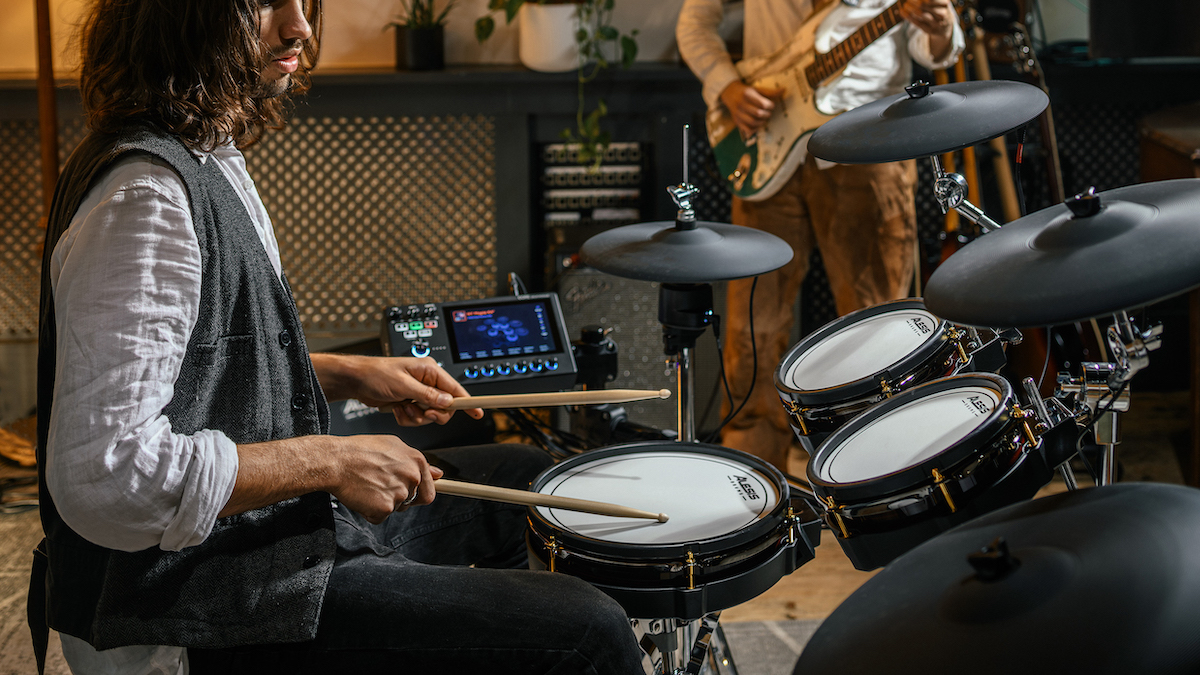
We’ve rounded up some of the most common terms you might hear below. For a full A-Z, check out our electronic drums jargon buster.
Aux input: A jack for plugging in phones or other smart device so you can play along to music. In our experience, this can be an indispensable way to get beginner drummers to fall in love with drumming.
Coaching mode: Built-in lessons or practice tools to help improve timing, speed, and coordination. Not all kits offer this, so be sure to watch tutorials before purchasing if this is a must for you.
Cymbal choke: A feature where you can grab the cymbal to stop the sound, just like with acoustic cymbals.
Dual-zone pads: Pads that can produce two different sounds depending on where you hit (eg. rim vs centre). This is meant to replicate the multitude of tones you can get from a real drum, depending on where it is struck.
Hi-hat controller pedal: Simulates open/closed hi-hat playing. Some kits offer better expression and realism than others.
Latency: The small delay between hitting a pad and hearing the sound. Good kits have very low latency so this delay is not noticeable.
Mesh pads: Drum pads made from woven synthetic mesh. They’re quieter and more responsive than rubber pads, offering a closer feel to acoustic drums.
Module (brain): The control centre of the kit. It houses all the drum sounds, settings and inputs/outputs. Also called the sound module.
Rack: The frame that holds the kit together. Some are collapsible for easy storage.
Rubber pads: Pads with a solid rubber surface. Often cheaper and longer-lasting, but typically louder and less realistic in feel.
Triggers: Sensors inside the pads or cymbals that detect hits and send that information to the module to produce a sound.
USB/MIDI output: Lets you connect to a computer or other digital equipment. Useful for recording, triggering drum software or online lessons.
Velocity (or sensitivity): The module responds differently depending on how hard you hit the pad. Essential for expressive playing.
Drumeo free trial
Drumeo Edge: 30 day free trial
Drumeo is the place for online drum lessons right now, thanks to a huge range of high quality content that's carefully structured to guide players to better drumming. MusicRadar readers can get a full month of Drumeo for free (rather the standard 7-day trial) via the 'view deal' button below. Read our full 5-star Drumeo review.
How we test beginner e-kits
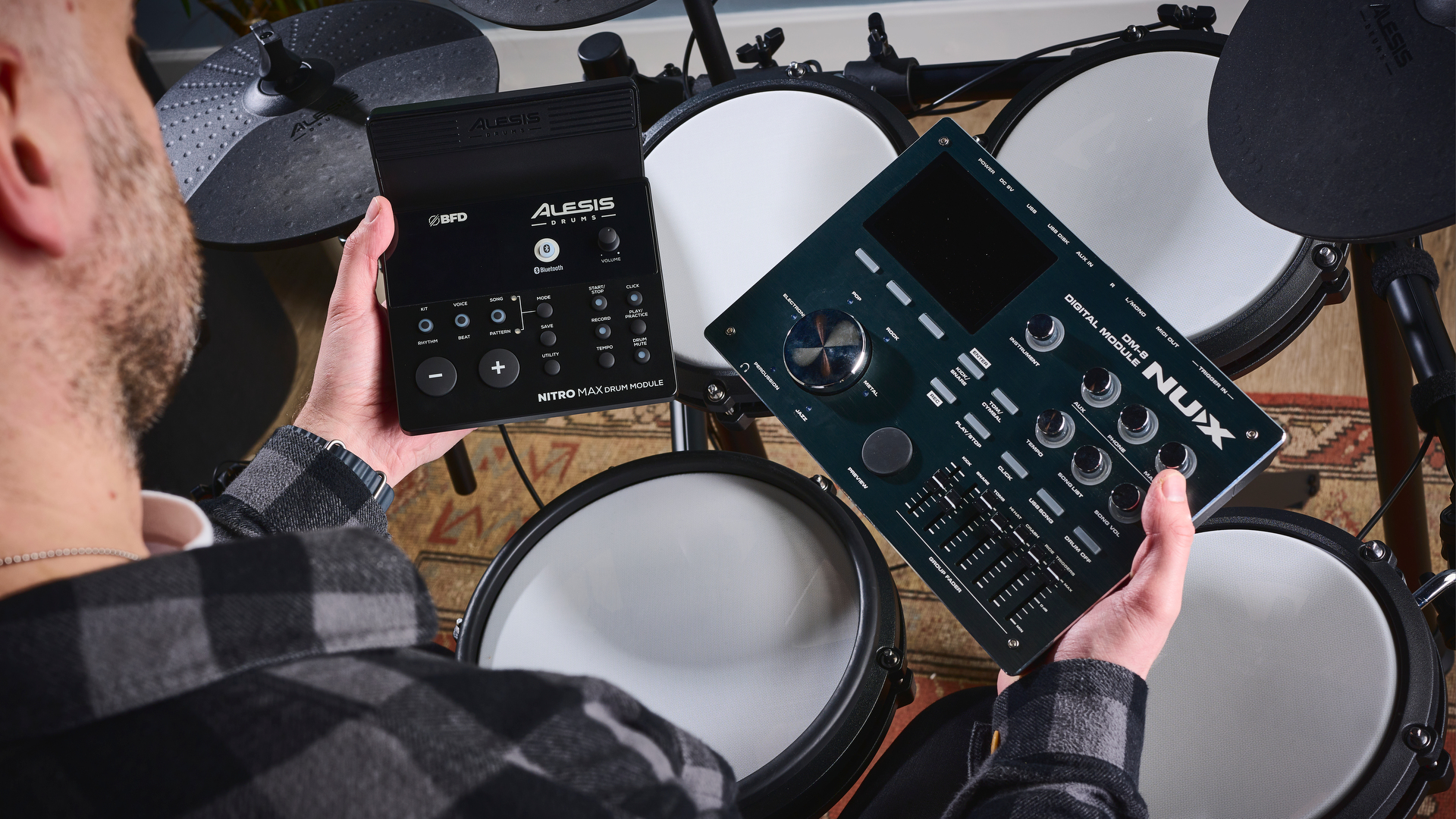
Our process for testing beginner electronic drum sets is editorially independent and not influenced by any third parties. Our review samples are almost always sourced directly from the manufacturer or via a local distributor. Sometimes review samples will be supplied by retailers. In rare cases where we can't get hold of a kit in this way, we will pay for a set with out own money.
Our expert e-kit testers use each featured kit for a number of weeks, evaluating the instrument in the following categories and comparing the review kit with other kits in the same field and price bracket. These categories are considered with a particular focus on the beginner drummer:
- Ease of use/setup
- Sounds
- Build quality and durability
- Connectivity
- Other features
This enables us to produce accurate, well-balanced and real-life electronic drum set reviews to help you easily figure out whether the kit you’re interested in really is the best choice for you.
Our testing criteria in detail:
- Ease of use/setup: How easy is the kit to construct out of the box? Are the instructions useful? Once built, how easily can the kit be adjusted to fit the setup needs of the average beginner drummer? Is the module user-friendly? Are the instruction provided by the manufacturer clear enough to navigate all the menus and features?
- Sounds: What level of quality are the supplied sounds? We’re not necessarily looking at quantity here. A large number of sounds is often an attempt to cover up a lack of quality. We’re also looking at the variety of sounds on offer, and the level of editing functionality for those sounds.
- Build quality and durability: Here, we assess the physical feel of the pads/cymbals and the response of the playing surfaces. Are the components - such as wing screws, cymbal arms, ball and socket joints, module mounts - of an adequate quality and designed to last?
- Connectivity: How easy is it to connect pads to the module? Is there an opportunity for expansion with more pads? Is there also USB/MIDI connectivity for recording?
- Features: What additional features come complete with the kit or module and how well do they work? For example, many e-kits now feature Bluetooth connectivity, but how reliable is it and how easy is the connection process? Is it possible to add your own sounds to the module? If so, how easy is this process? For beginners, learning tools are key to the playing development. As such we asses the options available their usability and whether they have a genuine benefit to new players.
Our testing team includes:
- Expert reviewers with years of hands-on experience testing and owning a wide range of electronic drum sets and with a deep understanding of e-kit technology as it has evolved.
- Industry professionals who have worked in the drum/music industry for decades, including Editor positions for leading drumming magazines and websites. Some of our reviewers are also drum teachers and have worked in drum shops.
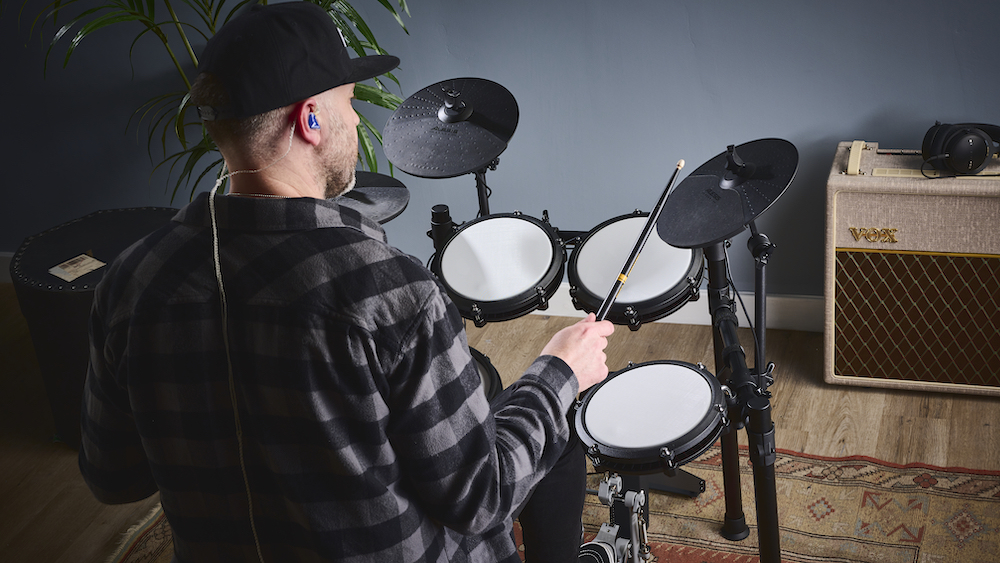
"I've been working in the drum industry since 2004, holding various roles within drum media, including Editor of the UK’s best-selling drum magazine, Rhythm, which I did for 7 years until 2016. Over the last two decades I have been tuned into the electronic drum market, covering key e-kit launches, attending trade shows (such as NAMM, the UK Drum Show and the now defunct MusikMesse) and playing and testing countless kits from every brand. Since originally writing this best electronic drum sets buyer’s guide in 2018, it has been my job to keep this page up-to-date, accurate and helpful. With a young son at home, I currently have no gigs in the calendar, so I get my drumming fix behind an e-kit in my home workshop."
Current e-kit: Alesis Strata Prime (long-term loan), NUX DM-8 (personal kit)

"I'm a freelance member of the MusicRadar team, specialising in drum news, interviews and reviews - I test the majority of electronic drum sets that come through the MusicRadar studio. You can also see me playing and chatting e-drums on the MusicRadar Tech YouTube channel. I formerly edited Rhythm and Total Guitar here in the UK, but drums is my primary instrument and I’ve been playing for more than 25 years (my arms are very tired). When I'm not working on the site, I can be found on my electronic kit at home, gigging and depping in function bands and working on the odd original project."
Current e-kit: Roland VAD507

"I'm a professional drummer with a long history of performing live anywhere from local venues to 200,000 capacity festivals. I'm a private drum tutor, in addition to teaching at the BIMM Institute in Birmingham. I'm also a regular feature writer and reviewer for MusicRadar, with a particular passion for all things electronic and hybrid drumming."
Current e-kit: A mega hybrid kit comprising Natal acoustic drums and a range of Roland pads. Tom recently upgraded to the Roland V71 module to run his electronics
Read more about how we test electronic drum sets at MusicRadar.
About our demo videos
One of the most significant factors to consider when choosing an e-kit is the sound it produces – that’s why our team have recorded and filmed demos for most of the kits in this guide. That way, you can make an informed decision based on which model you think sounds the best. These videos also give you a chance to take a closer look at each kit and see them in action.
Two of MusicRadar’s key e-drum testers, Tom Bradley and Stuart Williams, regularly visit our dedicated studio in Bath, UK to demonstrate kits, playing through a handful of sounds on each one. We haven’t done any editing of the sounds - what you’re hearing are the tones straight from the box.
Why trust us?
☑️ MusicRadar established 2007
☑️ Over 5,000 reviews on-site
☑️ 80+ e-kits reviewed
MusicRadar first launched in 2007 and has been an authority on electronic drums ever since, rigorously testing the majority of key launches since day one. The site is run by a diverse team of passionate musicians who live to gig, record and jam, alongside a core group of trusted specialist freelance writers. We understands what players need, because we’re players ourselves, and we test from this perspective.
Our team have been testing music gear for 18+ years, constantly refining our methodology, delving deeper into products and drawing on our experience of what has come before to understand today’s products better than anyone.
Latest updates
25/07/25: This guide has had a complete overhaul, including auditing and switching up the product list and going into much greater depth on each of our choices to help you understand more about we do and don't like. We've also been busy filming demo videos of the kits in this guide and have added the first few demos from our shoots, with more to come. In addition, we've added more buying advice and a new jargon buster to help tune you into the mostly common words and phrases surrounding e-drums.
Read more:
MusicRadar's got your back
- Get started with the best drumsticks for beginners
- Check out the best compact drum kits for all levels
- These are the best gifts for drummers at every budget
- Essential drum accessories every player needs
- Easy drum songs every beginner should learn
Want all the hottest music and gear news, reviews, deals, features and more, direct to your inbox? Sign up here.
I'm MusicRadar's eCommerce Editor. In addition to testing the latest music gear, with a particular focus on electronic drums, it's my job to manage the 300+ buyer's guides on MusicRadar and help musicians find the right gear for them at the best prices. I dabble with guitar, but my main instrument is the drums, which I have been playing for 24 years. I've been a part of the music gear industry for 20 years, including 7 years as Editor of the UK's best-selling drum magazine Rhythm, and 5 years as a freelance music writer, during which time I worked with the world's biggest instrument brands including Roland, Boss, Laney and Natal.
